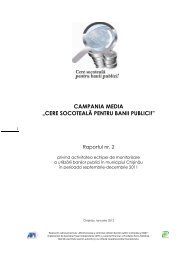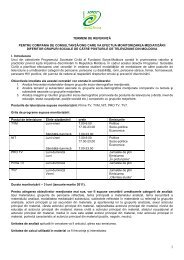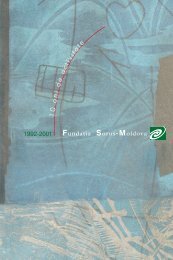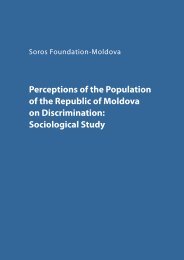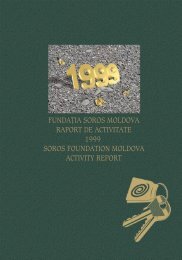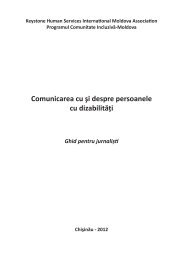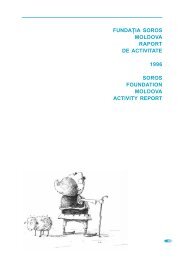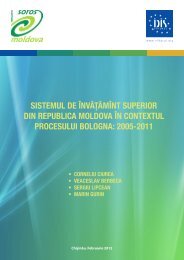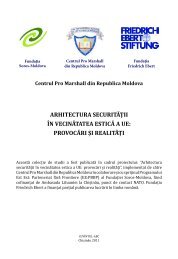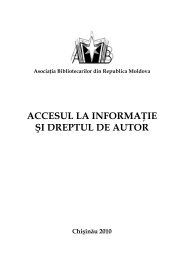Activity report for 1999(PDF) - Soros Foundation Moldova
Activity report for 1999(PDF) - Soros Foundation Moldova
Activity report for 1999(PDF) - Soros Foundation Moldova
Create successful ePaper yourself
Turn your PDF publications into a flip-book with our unique Google optimized e-Paper software.
The above mentioned data demonstrate the critical<br />
necessity of directing program activities towards supporting<br />
rural schools.<br />
Objective 3. Training of Trainers <strong>for</strong> Mathematics<br />
and Sciences<br />
The recently developed curricula in Mathematics<br />
and Sciences has prompted the initiative to start working<br />
on teacher training programs <strong>for</strong> teachers in these<br />
subject areas. It required the establishment of a new<br />
team of trainers.<br />
Four subject areas were added to the program:<br />
physics, mathematics, biology and chemistry. The following<br />
trainers were selected:<br />
Viorel BOCANCEA, lecturer, Tiraspol Pedagogical<br />
University<br />
Tatiana IACUBUfiCHI, vice-principal, Matei Basarab<br />
Lyceum, Chiøinæu<br />
Lidia BEZNIfiCHI, vice-director, Lapuøna County<br />
Department of Education<br />
Roman COPÆCEANU, teacher, Cærpineni Theoretical<br />
Lyceum<br />
Tamara CURTESCU, methodologist, Municipal<br />
Department of Education, Chiøinæu<br />
Nina BÎRNAZ, teacher, Spiru Haret Lyceum,<br />
Chiøinæu<br />
Tatiana DUDNICENCO, post-graduate student, State<br />
University of <strong>Moldova</strong><br />
Valeriu GORINCIOI, director, Cælæraøi Theoretical<br />
Lyceum<br />
Silvia LOZOVANU, methodologist, Municipal<br />
Department of Education, Chiøinæu<br />
Igor POVAR, lecturer, State University of <strong>Moldova</strong><br />
Nadejda VELIØCO, chief of the Pre-university Education<br />
Department, Ministry of Education and Sciences<br />
Beginning with October <strong>1999</strong>, these educators were<br />
involved in a wide variety of training activities and<br />
educational events. The topics <strong>for</strong> professional development<br />
training modules included:<br />
Necessity of Change<br />
Management of Change<br />
Personal Efficiency<br />
Conflict Resolution<br />
Problem Solving<br />
Giving and Receiving Feedback<br />
Specific Features of a Training <strong>Activity</strong><br />
Reading and Writing <strong>for</strong> Critical Thinking<br />
Useful Techniques <strong>for</strong> Working with Adults<br />
Presentation Skills<br />
Psychological Aspects of Teaching Adults<br />
Evaluation<br />
Interactive Methods of Teaching and Learning<br />
Cooperative Learning. Group Work<br />
Stimulating Creativity<br />
Elements of Psychological Counseling<br />
<strong>1999</strong> ACTIVITY REPORT<br />
Objective 4. Establishing Partnerships with<br />
the New County Departments of Education<br />
During December 15-20, the Pro Didactica Educational<br />
Center, at the Ministry of Education and<br />
Science’s request and in collaboration with Ministry<br />
specialists, organized a training program <strong>for</strong> the directors<br />
and vice-directors of the new County Departments<br />
of Education. 40 persons attended this event.<br />
The objectives of this activity were as follows:<br />
– to establish relations of collaboration with the<br />
County Departments of Education<br />
– to identify the specific problems and priorities in<br />
each county<br />
– to identify areas of need that will help to plan<br />
the Center’s activity in 2000, in order to assist educational<br />
re<strong>for</strong>m at the regional level<br />
– to identify professional development needs <strong>for</strong><br />
county department staff<br />
The team of trainers from Pro Didactica Educational<br />
Center provided a three-day training module<br />
on Managerial Roles, which had a very strong impact<br />
on participants. Several Ministry specialists were also<br />
involved as trainees. They evaluated the program as an<br />
effective model of training adults, an alternative to<br />
other existing programs provided by state institutions.<br />
The content, the interactive methods and techniques,<br />
the open atmosphere were highly appreciated.<br />
Projects to be implemented in 2000:<br />
Training of trainers in school evaluation and<br />
assessment<br />
$ 19,941<br />
Training of trainers in educational management,<br />
the humanities, math and sciences<br />
$ 18,041<br />
Training <strong>for</strong> school managers and Regional<br />
Departments of Education staff<br />
$ 20,000<br />
SECTION IV. OTHER INITIATIVES.<br />
$ 4,807<br />
The Applied Economics Program of Junior Achievement<br />
<strong>Moldova</strong> was supported through a grant focused<br />
on:<br />
– Training activities <strong>for</strong> teachers involved in program<br />
implementation<br />
– Special events <strong>for</strong> students (national contest, student<br />
companies competition, etc.)<br />
– Curriculum development and methodology conferences<br />
<strong>for</strong> teachers<br />
– Participation of students, teachers and program<br />
coordinators at international events within JA network<br />
(JA International Conference, July 11-14, <strong>1999</strong>, India-<br />
27




